Andrew Furst's Blog, page 139
March 23, 2015
Dialectic Two-Step – A Rant On The Mindfulness Movement
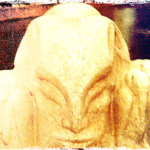 Dialectic Two-Step is an ongoing series of my thoughts on questions that come my way.
Dialectic Two-Step is an ongoing series of my thoughts on questions that come my way.
Wisdom lies neither in fixity nor in change, but in the dialectic between the two. - Octavio Paz
A Rant On The Mindfulness MovementI keep a close eye on news about mindfulness and meditation. It’s been nice to see how the scientific community has embraced the data about these wonderful practices. Jon Cabot Zinn’s work in Mindfulness Based Stress Reduction has shown that substantial gains in quality of life can be had with a regular meditation practice. Studies have shown the benefits of meditation in treating hypertension, pain, and stress. But the mindfulness movement is beginning to attract snake oil salesmen looking for a fast buck.
It was inevitable. So I’ve held off on the rant. Until now.
What pushed me to the tipping point was an article that made the claim that Mindfulness Is More Effective Than Drugs For Both Anxiety and Depression. Here’s where I draw the line. The headline and content of the article seems to lead the reader to believe that they can skip their medication and and just meditate. I’m all about mindfulness as a part of treatment for depression and anxiety, but that’s dangerous and irresponsible.
Here’s where I want to be completely clear:
Medications work whether your conscious of your symptoms or not. Mindfulness does not.
Meditation and mindfulness only work when you have a steady practice and you are 100% successful in detecting your mood and other symptoms. As humans we are terrible at recognizing and responding to our own problems. At best mindfulness is a supplement to medication. In terms of efficacy, this article is drawing unwarranted conclusions from the studies it references. When it comes to treating depression and anxiety, I love the pharmacy. I speak from experience in both meditation (10 years or more of practice) and depression.
Ethically, authors of articles like this, are treading the wrong side of the line. Convincing someone to stop taking their medications in favor of a meditation routine is reprehensible. Skipping meds can have serious repercussions, including worsening symptoms, self harm, systemic health problems, and suicide. When it comes to mental health issues always consult a certified professional. Medical treatment can absolutely be enhanced with mindfulness, but it’s not for everyone, and it’s not a replacement. Steer clear from this new breed of snake oil salesmen.
Get Each Week's Dialectic Two Step in your email boxFirst Name:
Last Name:
Email address:
In addition to a monthly email you can also subscribe to the following weekly series:
One Minute Meditations
Tiny Drops (Photography series)
Compass Songs (My Favorite Poems)
Dialectic Two-Step
Modern Koans (interesting questions)
Sunday Morning Coming Down (Music Videos)
Relics (Timeless Republished Articles)
Say What?
Quotes
Verse Us (Poems I Write)
The post Dialectic Two-Step – A Rant On The Mindfulness Movement appeared on Andrew Furst.
March 22, 2015
One Minute Meditation – Skug River Swamp
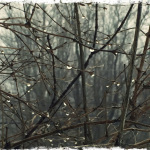 One Minute Meditations is an ongoing series of short videos, poems, and commentary intended as a meditation. Offered as an opportunity to step back from your cyber routine and settle into a more natural rhythm, if only for a minute.
One Minute Meditations is an ongoing series of short videos, poems, and commentary intended as a meditation. Offered as an opportunity to step back from your cyber routine and settle into a more natural rhythm, if only for a minute.
(Note: This meditation was originally posted last year)
Transitions are what drive life and life drives transitions. This week’s one minute meditation was shot during March’s shift from lion to lamb at Harold Parker State Forest in nearby Andover, Massachusetts.
Visually and audibly it portrays the beauty and barrenness of winter contrasted by the emergence of spring. The sound of the wind blowing across the ice says winter. The cacophony of birds and temperature in the mid 50’s says spring.
Transitions are where it’s at when we’re looking to understand life.
Gaia HypothesisI’m just wrapping up what might be one of my favorite books of all time – This Explains Everything. It’s a collection of essays by eminent thinkers on what they feel are the most deep, beautiful and elegant theories of how the world works. Dinosaur paleontologist Scott Sampson writes about the Gaia hypothesis.
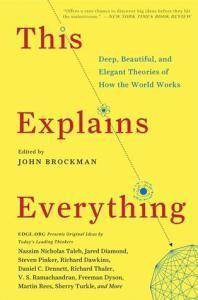 The hypothesis suggests that organisms interact with their inorganic surroundings on Earth to form a self-regulating, complex system that contributes to maintaining the conditions for life on the planet. Examples given in support of the hypothesis include:
The hypothesis suggests that organisms interact with their inorganic surroundings on Earth to form a self-regulating, complex system that contributes to maintaining the conditions for life on the planet. Examples given in support of the hypothesis include:
Planets without life don’t adapt like that.
If the hypothesis is correct, life itself adapts to preserve itself and it’s environment. The current global warming phenomenon is an example of a transition that we’re in right now. In the worst case scenario, human life may be the price of keeping the balance. As one of the hypothesis’ chief proponents stated,
“Gaia is a tough bitch — a system that has worked for over three billion years without people. This planet’s surface and its atmosphere and environment will continue to evolve long after people and prejudice are gone.”
– Lynn Margulis (1937 – 2011)
Now that’s a vision of the divine that I can connect with. Powerful and real.
The idea of a human focused divinity misses the reality of the situation. Life (not humanity) is preserved in a delicate balance that adapts to renew itself. Gaia and Buddha Amitabha embody this metaphor perfectly. Both are urging us to let go of the delusions of the self centered world view so we can save ourselves. The endless life of Amitabha isn’t about you and me. The endless light of Amitabha is about opening our eyes to the reality of the situation. Open your eyes and see Gaia as she is, the tough bitch that will lay waste to our economy and to the lives of millions of people if you ignore her. We should revere her as the protector and sustainer of life, but recognize her wrath.
GoddessGiving birth is life
Shifting forms to sustain us
Praise her boundless gifts
First Name:
Last Name:
Email address:
In addition to a monthly email you can also subscribe to the following weekly series:
One Minute Meditations
Tiny Drops (Photography series)
Compass Songs (My Favorite Poems)
Dialectic Two-Step
Modern Koans (interesting questions)
Sunday Morning Coming Down (Music Videos)
Relics (Timeless Republished Articles)
Say What?
Quotes
Verse Us (Poems I Write)
The post One Minute Meditation – Skug River Swamp appeared on Andrew Furst.
Sunday Morning Coming Down – Galaxia
 Sunday Morning Coming Down is an ongoing music video series. The songs fit my definition of music for a lazy couch bound Sunday morning.
Sunday Morning Coming Down is an ongoing music video series. The songs fit my definition of music for a lazy couch bound Sunday morning.
This beautiful song in Spanish by Ana D caught my ear in the late 90’s. Its chorus, translated to English is wonderful
Get Each Week's Sunday Morning Coming Down in your email boxAnd between the distance
our kiss was born a galaxy
First Name:
Last Name:
Email address:
In addition to a monthly email you can also subscribe to the following weekly series:
One Minute Meditations
Tiny Drops (Photography series)
Compass Songs (My Favorite Poems)
Dialectic Two-Step
Modern Koans (interesting questions)
Sunday Morning Coming Down (Music Videos)
Relics (Timeless Republished Articles)
Say What?
Quotes
Verse Us (Poems I Write)
Galaxia
by Ana D
Con mi casa ardiendo
flota el fluido del sueño
en terciopelo de madrugada
sobre almíbar de dolor
El cielo sucio brilla despacio
borracho, ante las caricias
de tu cuerpo de verano
mientras la noche se quita la vida
Y entre la distancia
de nuestro beso ha nacido una galaxia
Y entre la distancia
de nuestro beso de lejos ha nacido una galaxia
The post Sunday Morning Coming Down – Galaxia appeared on Andrew Furst.
March 21, 2015
Say What? – A Better World?

Say What? is an ongoing series of laconic exchanges on Buddhism in the format of a comic strip.
This shirt is dry clean only. Which means... it's dirty. - Mitch Hedberg

A Better World?
Get Each Week's Say What? in your email box
First Name:
Last Name:
Email address:
In addition to a monthly email you can also subscribe to the following weekly series:
One Minute Meditations
Tiny Drops (Photography series)
Compass Songs (My Favorite Poems)
Dialectic Two-Step
Modern Koans (interesting questions)
Sunday Morning Coming Down (Music Videos)
Relics (Timeless Republished Articles)
Say What?
Quotes
Verse Us (Poems I Write)
.mc4wp-form input[name="_mc4wp_required_but_not_really"]{display:none !important}
The post Say What? – A Better World? appeared on Andrew Furst.
Relics – Is Your Salvation 401k Well Funded?
 The Relics series are throwback articles from previous years. They seem timeless enough to be relevant today.
The Relics series are throwback articles from previous years. They seem timeless enough to be relevant today.
Try as you will, you cannot annihilate that eternal relic of the human heart, love. - Victor Hugo
Is Your Salvation 401k Well Funded?When, being saved by the inconceivable power of [Amitabha] Buddha’s Vow, your birth in [Amitabha’s] Pure Land is assured beyond any doubt and the desire to say the nembutsu erupts within you, in that instant you are clasped fast by [Amitabha], never to be abandoned, thus entering into absolute happiness. - Tannisho
O God, you are my God; earnestly I seek you; my soul thirsts for you; my flesh faints for you, as in a dry and weary land where there is no water. - Psalm 63:1
To westerners like me who grew up Christian, the Pure Land School is probably the closest thing to familiar that Buddhism has to offer. There is an other-ness to Amitabha Buddha that is analogous to the God of the Abrahamic traditions.
The quote above from the great Japanese text Tannisho has an old time revival ring to it. The author bears witness to the spontaneous desire to call to the Buddha as we are saved from our own sin and transgressions! Can I get an Amen?
The Pure Land school of Buddhism in Japan was something of a revival movement. It’s history arises out of popular sects led by seminal figures like Shinran and Ippen, who roamed the countryside spreading the word. The word was the Nembutsu – chanting Namo Amida Butsu (Chinese: Namo Amitofo) – and it is the act of recalling the Buddha.
The Self vs. The OtherWhen we say Buddha Amitabha, or other power, what are we talking about ? It begins by understanding self. The Buddha warned us to be careful when we talk about self-reliance.
If we’re honest with ourselves, we have to concede that we are incapable of doing much without the help of others. We are always in relationship to and in reliance on an other.
Think about it. Getting up in the morning, I depend on the sun, the alarm clock, electricity and myriad people who keep the systems of modern comfort ticking. Independence is relative. No one is entirely independent. Reflection on our reliance on others helps to define true faith. We go about our lives with an overwhelming amount of faith in what others do for us. We have profound faith in our alarm clocks, our parents, and the people who manufacture our food, clothing, shelter, and so on.
Reliance on others is a fact of life. The notion that we are islands is a delusion. When we talk about Pure Land Buddhist faith, we are talking about faith in Buddha Amitabha. In the most practical terms, Amitabha is the interdependent web of life. Faith in Buddha Amitabha is faith in the interdependence.
What is Salvation?Most of us treat salvation like a 401k. We look to scripture, to the examples of the saints, and religious leaders for models of how to conduct ourselves towards salvation. The idea is, if we invest wisely, we’ll get a good return. But is salvation really transactional? Can we rack up enough points? How many good deeds, prayers, and choir practices does it take to get to heaven? What amount of good works will relieve us from the difficulties of this life?
This is the delusion of self-reliance. If we are utterly reliant upon others for everything in our lives, what can we possibly do to save ourselves? When we let go of the transactional concept of salvation, we are saved. The eruption of gratitude, compassion and wisdom that comes about from acknowledging that we’re practically helpless is the revelation. To borrow from Evangelical Christianity, it’s being born again.
This is the breakthrough that the Buddha came to. He recognized that the notion of self-reliance is the biggest barrier to freedom. Liberation is not an accumulation of good deeds. Good deeds are the natural consequence of letting go of the idea we can go it alone. Let go of the misconception that we’re in control. Recognize that we are indebted to everyone around us for our fortunes and comfort. Let this realization guide you towards a life lived in gratitude, compassion and wisdom.
Namo Amitofo.
Get Each Week's Relics article in your email boxFirst Name:
Last Name:
Email address:
In addition to a monthly email you can also subscribe to the following weekly series:
One Minute Meditations
Tiny Drops (Photography series)
Compass Songs (My Favorite Poems)
Dialectic Two-Step
Modern Koans (interesting questions)
Sunday Morning Coming Down (Music Videos)
Relics (Timeless Republished Articles)
Say What?
Quotes
Verse Us (Poems I Write)
The post Relics – Is Your Salvation 401k Well Funded? appeared on Andrew Furst.
March 20, 2015
Modern Koans – Why Right View?
 Modern Koans is an ongoing series that recognizes that good questions are often more important then their answers.
Modern Koans is an ongoing series that recognizes that good questions are often more important then their answers.
The riddles of God are more satisfying than the solutions of man. ― G.K. Chesterton
The Eightfold Path Series
This is the one of several posts I will be offering titled the Eightfold Path Series. As I've reflected on my experience, I've come to see the Path as both the practice and the fruition. As we inch closer to realization of our true nature, we discover that the wisdom, ethics, and concentration prescribed in the Buddha are the most natural expression of our being.
John Daido Loori Roshi's book Invoking Reality was transformational for me. In it Roshi turns the path on it's head in a way that uncovers it's challenge to us. The path and the precepts are not rules and regulations that lead to punishment by the karmic cosmos, but a way for us to see our true selves by looking through the prism of these personal dimensions. I see the path and the precepts as questions, not rules. Let's explore them.
Why Right View?Belief is an interesting thing. The western Judeo-Christian religions are described as the first to require an adherent to believe. Prior to Judaism ritual sacrifice served the function of pleasing the God(s) to ensure favorable conditions for survival – fertility, rain, crops, defeat of an enemy, etc. Abraham was asked by Yaweh to sacrifice his son Isaac. When he was about to kill Isaac, the angel of God stopped him at the last minute, saying “now I know you fear God.” With the God of Abraham there is a transition from ritual sacrifice to faith, most dramatically in Christ. There is also a change in function, from meeting the practical survival needs in this life, to the promise of reward in an afterlife. In Christianity and Islam, salvation comes through belief that Christ is savior or that Mohammed is the last prophet.
Detractors of western religion point to this as its flaw. Directed by people interested in power, it has become a tool to control people. Marx described religion as the opiate of the people. When a religion conditions people to a belief system that is detached from evidence, they become susceptible to control by the wicked. Rev. Jim Jones, The Branch Davidians of Waco Texas, and the Heavens Gate groups serve as examples of how this can end in tragedy.
In the face of this concern, I want to examine the first step in the Buddhist Eightfold Path – Right View. Unfortunately it sounds very similar to the faith requirement of western religions and frankly one of the things that left me cold to Christianity. Is Right View another faith allegiance?
Right view (samyag-dṛṣṭi / sammā-diṭṭhi) can also be translated as “right perspective”, “right outlook” or “right understanding”. – Wikipedia
The entire Eightfold Path is tightly integrated. Each element informs the others. Explanations are often complex, so I’ll do my best to keep it straightforward. To start, I’d offer a summary that the Buddha offered near his death.
All that I teach is suffering and the end of suffering – The Buddha
In this context, I’ll use, as a means of explanation, the Three Dharma Seals – impermanence, non-self, and nirvana – as an umbrella construct to characterize what Right View means. The Seals are said to be a test for authenticity of a teaching. If someone expounding Buddhism says anything that contradicts these three principles, you can reject what they are saying. In essence you can say that it does not reflect Right View.
Impermanence – All compound things decay. They arise out of other things, like the flower from a seed. All things decay. They transition on to other things, like soil and nutrients for the next generation.
Non Self – When we deeply examine who we are we realize that we too are impermanent; subject to birth, illness,aging, and death. Everything about us changes, including our bodies, our minds, character, and personality. Suffering arises when we believe and act in contradiction to this facts.
Nirvana – We can realize an end to suffering when we act in accordance with the world as it is. When we free ourselves from beliefs contradictory to natures observed characteristics, we can reduce our suffering. When we free ourselves from deluded views of our own nature, we can reduce our suffering. The knowledge that each person and thing is precious in its frailty brings about a deep appreciation for this life. When we act in accordance to impermanence, we can find love, compassion, joy, and equanimity.
I have argued that there is faith in Buddhism, but I’m careful to define what I mean by this faith. In my mind faith is something that develops with repeated confirmation. For instance, I have faith that the sun will rise in the east. Perhaps I should adjust my language and use the word confidence. Right View (perspective, outlook, or understanding) is one that conforms to our experience in nature. It comes with a litmus test – the need for evidence.
At least that’s how it’s described in the Sutras.
So is Right View a belief or faith allegiance?
Is Right View the same as faith other religions?
Is Buddhism just another institution that is subject to abuse of power, through enforcing belief and offering rewards that can’t be verified?
In its correct form I would argue that Buddhism is not subject to these failings. But in practice I must admit that all of these things happen. What’s your view of the house that Buddha built?
What do you think? I’d love to hear your thoughts in the comments section below. Get Each Week's Modern Koan in your email boxFirst Name:
Last Name:
Email address:
In addition to a monthly email you can also subscribe to the following weekly series:
One Minute Meditations
Tiny Drops (Photography series)
Compass Songs (My Favorite Poems)
Dialectic Two-Step
Modern Koans (interesting questions)
Sunday Morning Coming Down (Music Videos)
Relics (Timeless Republished Articles)
Say What?
Quotes
Verse Us (Poems I Write)
The post Modern Koans – Why Right View? appeared on Andrew Furst.
March 19, 2015
Schrödinger On Oneness
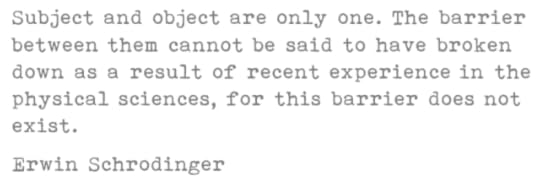
The post Schrödinger On Oneness appeared on Andrew Furst.
One Minute Meditation – Candle Light
 One Minute Meditations is an ongoing series of short videos, poems, and commentary intended as a meditation. Offered as an opportunity to step back from your cyber routine and settle into a more natural rhythm, if only for a minute.
One Minute Meditations is an ongoing series of short videos, poems, and commentary intended as a meditation. Offered as an opportunity to step back from your cyber routine and settle into a more natural rhythm, if only for a minute.
Be it to candle light or a camp fire, we are like moths to the flame. Light in it’s most primal form – fire – draws us in. I can imagine that it has had a significant hand in shaping human spirituality. Fire plays a key role in the Vedic traditions and it carries powerful metaphors for the practice of meditation.
In many tantric practices we are taught to participate in an imagined exchange with a deity. The practice carries rich meaning, but it also brings with it a very physical opening when we accept whatever the deity has to offer. When I chant Namo Amitofo, I accept life itself from Buddha Amitabha. Its a liberating experience – energetically, physically, and mentally. I surrender in a very physical way. The sensation of taking refuge is all encompassing. The supplication is as complete as I can muster.
The experience of primal fire light gives us a touch point to imagine the sensations of taking refuge. While watching this video, allow your attention to be drawn to the candle light. Feel the connection between the sights and sounds of the video and your internal landscape. Allow the flow of energy to be unencumbered by tension, intention, or control. Accept and offer everything.
In this experience, there is an opening of the body that I would describe as a blossoming. This is the the jewel in the lotus. Open awareness (the jewel) of the eternally blossoming present moment (the lotus).
Om Mane Padme Hum
FlickeringWarm mesmerizing
light, carries you off to dreams
flittering near death
 I Need to Start Writing Things Down by Chris Zabriskie is licensed under a Attribution License. Permissions beyond the scope of this license may be available at http://chriszabriskie.com
I Need to Start Writing Things Down by Chris Zabriskie is licensed under a Attribution License. Permissions beyond the scope of this license may be available at http://chriszabriskie.com
First Name:
Last Name:
Email address:
In addition to a monthly email you can also subscribe to the following weekly series:
One Minute Meditations
Tiny Drops (Photography series)
Compass Songs (My Favorite Poems)
Dialectic Two-Step
Modern Koans (interesting questions)
Sunday Morning Coming Down (Music Videos)
Relics (Timeless Republished Articles)
Say What?
Quotes
Verse Us (Poems I Write)
The post One Minute Meditation – Candle Light appeared on Andrew Furst.
March 18, 2015
Verse Us – Eden’s Address – A Video Poem
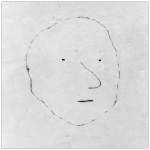 Verse Us - Poems I write: haiku, senryu, mesostics, free verse, random word constructions, I might even use rhyme or meter once and a while.
Verse Us - Poems I write: haiku, senryu, mesostics, free verse, random word constructions, I might even use rhyme or meter once and a while.
I recommend viewing this in full screen.
Eden’s AddressMunicipal grey, empty,
A house of allegedly righteous character.
After a day or two, the chess-i-ness
becomes a game of desire.
Borrowing rook and pawn moves
to provide some veneer of order.
Arrest time, or give us some kind of a sign,
In these otherwise unreadable moments.
Something to measure?
Sooth this wont to parse the wilderness.
Get Each Week's Verse Us in your email box
First Name:
Last Name:
Email address:
In addition to a monthly email you can also subscribe to the following weekly series:
One Minute Meditations
Tiny Drops (Photography series)
Compass Songs (My Favorite Poems)
Dialectic Two-Step
Modern Koans (interesting questions)
Sunday Morning Coming Down (Music Videos)
Relics (Timeless Republished Articles)
Say What?
Quotes
Verse Us (Poems I Write)
.mc4wp-form input[name="_mc4wp_required_but_not_really"]{display:none !important}
The post Verse Us – Eden’s Address – A Video Poem appeared on Andrew Furst.
Tiny Drops – Old Things Newly Found
 Tiny Drops is an ongoing iPhoneographic series. The images represent moments of noticing on my part. For you, they are an offer to pause, observe, and take that noticing into your life. All photos are mine unless noted otherwise.
Tiny Drops is an ongoing iPhoneographic series. The images represent moments of noticing on my part. For you, they are an offer to pause, observe, and take that noticing into your life. All photos are mine unless noted otherwise.
 These works by Andrew Furst are licensed under a Creative Commons Attribution-NonCommercial-ShareAlike 4.0 International License.
These works by Andrew Furst are licensed under a Creative Commons Attribution-NonCommercial-ShareAlike 4.0 International License.
Click on images to view the full size slide show.
 arch figure
arch figure broke window cornered
broke window cornered doll filter
doll filter pencil sharpener
pencil sharpener rose
rose uke filterGet Each Week's Tiny Drops in your email box
uke filterGet Each Week's Tiny Drops in your email boxFirst Name:
Last Name:
Email address:
In addition to a monthly email you can also subscribe to the following weekly series:
One Minute Meditations
Tiny Drops (Photography series)
Compass Songs (My Favorite Poems)
Dialectic Two-Step
Modern Koans (interesting questions)
Sunday Morning Coming Down (Music Videos)
Relics (Timeless Republished Articles)
Say What?
Quotes
Verse Us (Poems I Write)
FIVE LIMITLESS THOUGHTS
May all living beings have happiness and its causes
May all be free from unhappiness and its causes
May all dwell in equanimity, free of attraction and aversion
May all quickly find the great happiness that lies beyond all misery
May all enjoy inner and outer peace now and forever
NAMO AMITOFOThe post Tiny Drops – Old Things Newly Found appeared on Andrew Furst.



